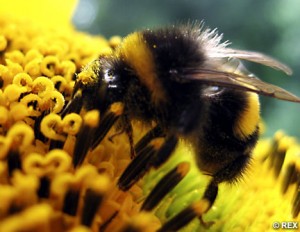I read the horrible news earlier this week that in Wilsonville, OR, some 50,000 bumblebees have been killed in the last few days. The bumblebees, which are perhaps some of the friendliest, least aggressive insects out there, had taken residence in a grove of European Linden trees skirting a Target parking lot.
It appears that a private extermination firm was hired to eradicate aphids that had infested the grove. I have a deep affinity for the natural world and an appreciation for our place within the greater apparatus of existence, needless to say, my heart broke at this news. However, I don’t write this to simply evoke a catharsis or hold a bitch fest about how globally irresponsible acts like this are (which is totally true). I am hoping to speak from a more educational point of view.
It is easy to lose sight (or to never have seen at all) of why flying pollinators like our poor bumblebees matter so much. How can one group of localized bumblebees affect all of our lives? Growing up I heard repeatedly that Albert Einstein was quoted as saying, “”If the bee disappears from the surface of the earth, man would have no more than four years to live.” It turns out that, more than likely, Einstein never uttered such a phrase.
The sentiment, however, is pretty dead on. To the untrained observer, even 50,000 bumblebee deaths seems insignificant when compared to the global population and to the sheer number of insects in general. Ever heard of the Butterfly Effect? I’m not talking about that Ashton Kutcher treatment. I mean the phenomenon out of chaos theory that theorizes the inter-connectivity of causality (e.g. a butterfly flapping it’s wings in Mexico could cause an avalanche in Tibet). Simplified, it means that everything effects everything else, to some degree.
I speak of this theory to illustrate why pollinators, specifically bees, are intrinsic to the survival of animal life on Earth. Without a healthy bee population, biodiversity suffers immensely. As a byproduct of their quest for nectar, the little hairs on a bees body pick up pollen from any plant on which they land. The bees then fly to another plant and, hence, cross pollination occurs, genetically increasing the plant’s ability to survive and adapt. No bees means a stagnant genetic pool for plants (in case you’re curious, inbred plants function about as well as in bred people).
Extrapolate that further. I could ask a middle school science student to tell me two reasons plants matter to life on Earth. I would invariably get some off color comments about marijuana, but predominantly, you would hear that plants produce oxygen and provide food (both directly as fruits and veggies, and indirectly as food for the other creatures we eat). Anyone out there want to venture a guess as to how long we would survive without oxygen and nutrition? Maybe that four year estimate of the aforementioned pseudo Einstein is too generous.
In recent years, bee populations have been nosediving, a phenomenon called Colony Collapse Disorder. There are direct correlations between pesticide use and colony collapse. We are literally cashing in our future existence for bug free parking lots.
Please Weedists, even if for the solely selfish reason of wanting to be here in a few decades to get stoned in a lawn chair, learn a little about the interconnectivity of life on Earth and spread the word. I sincerely doubt that most people would support pesticide use if they truly knew its ramifications, I choose to believe that the culprit is ignorance rather than cynicism.










